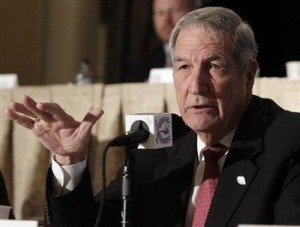Gene Stallings coached in the NFL in the late ’80s, in between the Jim Hanifan and Joe Bugel eras of Cardinals football. He was the man who led the team as the franchise relocated from St. Louis to Phoenix. He coached under Tom Landry for over a decade in Dallas. But Gene Stallings will always be remembered for working under Bear Bryant and for embodying what it meant to coach Alabama football.
Stallings played on Bryant’s famous Junction Boys team at Texas A&M, and coached under Bryant when the Crimson Tide won national championships in ’61 and ’64. After his failed stint in the NFL, Stallings returned to Alabama, this time as the head coach. His crowning achievement was winning the 1992 national championship, capping a 13-0 season.
So why the background on Stallings today? One of the fun things about owning a website is seeing where your traffic comes from. I noticed a bunch of hits were coming from RollBamaRoll.com. So I went to the site to see what was driving the traffic (as it turns out, a random link to this passer rating article) and I found this great quote by Stallings on another page:
Everyone keeps talking about our game with Miami [in the 1993 Sugar Bowl]. The reason we won against Miami is this: We had the ball 15 minutes more than they did. We ran the ball for 275 yards against Miami. They ran the ball for less than 50 yards. When the game was over, we won. After a game, it may not look good. The alumni may be asking why we are not entertaining them. Let me assure you that our job is to win football games. You win football games by running the ball, stopping the run and being on the plus side of giveaway-takeaways.
I think every coach [1]Mike Martz excluded, of course. at every level has, at some point, uttered a phrase to essentially the same effect. It is quintessential Alabama football, but it could have just as easily come out of the mouth of Greasy Neale or Bill Cowher or Vince Lombardi. Of course, whenever I read a quote like that, two immediate questions come to mind. Is it true? And how can I determine if it’s true?
[continue reading…]
References
| ↑1 | Mike Martz excluded, of course. |
|---|

